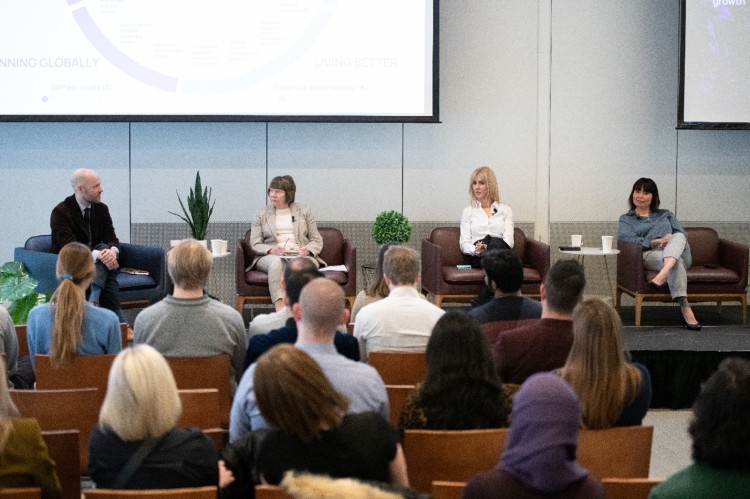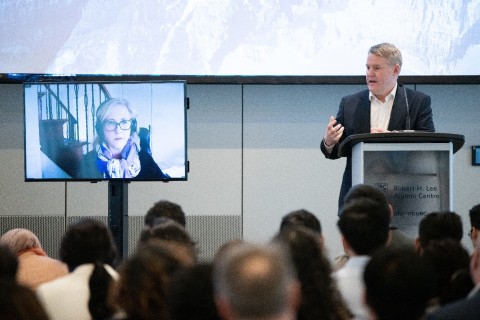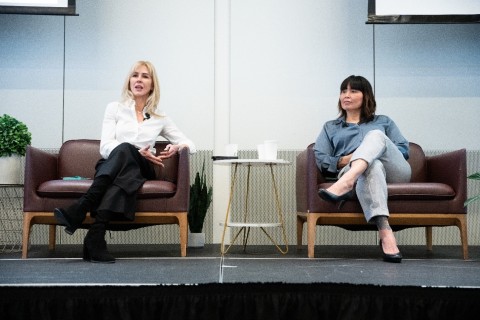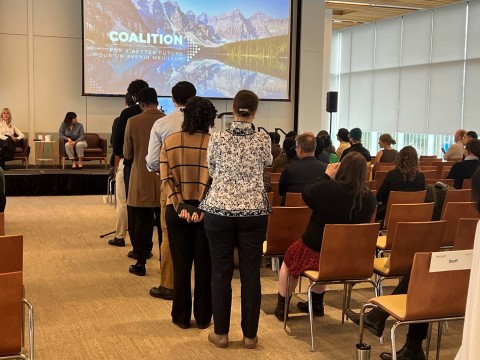CANADIAN IMMIGRATION UPDATES: Applicants to Master’s and Doctoral degrees are not affected by the recently announced cap on study permits. Read more

Tackling tough subjects: UBC Sauder and the Coalition for a Better Future invite students to talk about Canada’s economic future

Panelists from left to right: Justin Bull, UBC Sauder lecturer and Academic Director, Centre for Climate and Business Solutions; the Honourable Anne McLellan, co-chair, Coalition for a Better Future; Susannah Pierce, Shell Canada President and Country Chair; and Crystal Smith, Chief Councillor, Haisla Nation.
The UBC Sauder School of Business hosted a panel discussion on February 2 and invited UBC students from different faculties to meet with two former federal cabinet ministers, one energy executive, and one B.C. First Nations chief councillor. The purpose of the event was to connect students with business leaders to talk about Canada’s biggest economic challenges.
Opening communication channels across ideologies and generations
Students from UBC Sauder, the Faculty of Applied Science and other programs asked the panelists questions about climate action, housing, urban planning, healthcare, AI, closing the poverty gap, Indigenous economic participation, the role of public-private partnerships and more.
Justin Bull, UBC Sauder lecturer and Academic Director of the school’s Centre for Climate and Business Solutions, moderated the discussion. He emphasized the importance of creating opportunities for meaningful conversations involving diverse groups with different points of view.
“Creating a positive vision for the future is so important and that requires constructive dialogue, even dispute, from many different voices,” says Bull. “We created this forum because senior leaders need more opportunities to talk with younger leaders, who are the architects of the future.”
The Honourable Anne McLellan and the Honourable Lisa Raitt are former federal cabinet ministers – one a Liberal and the other a Conservative. Today they co-chair the Coalition for a Better Future, a national advisory council made up of 140 industry, labour, public policy, Indigenous, non-profit and other organizations that share a goal of creating a competitive, sustainable and inclusive economy.
“We call ourselves cross-partisan,” explains McLellan. “Lisa and I are two women with senior political experience coming together and saying the future of this country is just too important. It’s time to park the partisan bickering and get down to the business of solving the challenges we’re facing.”
Raitt, who attended the event remotely from Toronto, outlined the Coalition for a Better Future Scorecard, which tracks progress on Canadian economic, social and environmental indicators.
“We use 21 internationally recognized metrics and the goal is to see progress over time,” says Raitt who is also vice-chair of global investment banking at CIBC. “We’re sharing the latest scorecard in March, but I have a spoiler alert: We’re not doing great in all areas.”
Creating mutually beneficial partnerships
Joining the panel discussion were Susannah Pierce, President and County Chair of Shell Canada and Crystal Smith, Chief Councillor of the Haisla Nation, located in northwestern B.C. Smith, who is also Chair of the First Nations LNG Alliance, is working with Pierce on the $40 billion LNG Canada joint venture, being constructed in Kitimat B.C. in the traditional territory of the Haisla Nation.
Smith told the audience: “My nation has always said we want to have a share and we want to have a say in what’s going on in our territory. Susannah and her team took the time to find out what’s most important for the Haisla. Our conversations were not easy. There were many difficult topics that we had to come to a decision on. But today, we are at a point where having a share and having a say is an enormous reality for our community.”
Pierce was asked why more companies don’t pursue Indigenous business partnerships.
“I think it’s fear on both sides, but when you come into a conversation looking at what you share rather than what your differences are, you begin to build a relationship,” says Pierce. “Then you can start to translate that into a business relationship and begin to talk about projects that address both your interests.”
Laying the groundwork for a low-carbon economy
According to Raitt, decarbonizing Canada’s economy will require intensive capital allocation and accelerated technology development across industries.
“We all want to have energy transition, but we are learning it’s going to take longer than you think, it’s going to be more expensive than we thought, and we don’t actually have the technology yet to make it happen. There are some big unknowns, which makes it difficult from an investment point of view.”
Raitt added that governments need to create regulatory certainty.
“It’s worrying when different governments put in different rules and regulations,” notes Raitt. “That’s where industry and coalitions like ours have to step up and say we need regulatory agreements, frameworks and assurances in place in order to ensure the investments in energy transition are going to happen.”
Pierce noted that Canada’s transition to a net zero emissions economy will require an army of skilled workers.
“We need a lot of people engaged in the energy transition process as it’s so complex. We need young people with a wide range of educational backgrounds and perspectives. That’s why we are traveling across the country and visiting with students. We want to meet you and hear what you have to say on issues like climate action and building a strong and sustainable economy.”
UBC Sauder and the Coalition for a Better Future invite students to talk about Canada’s economic future



